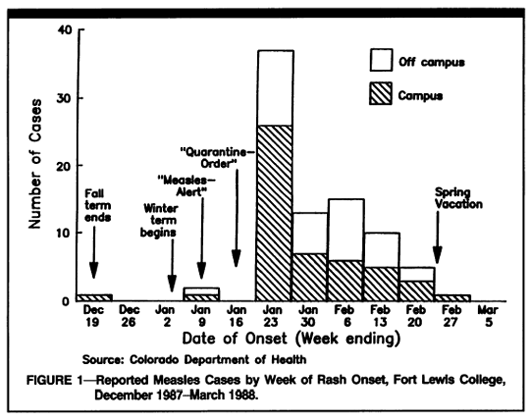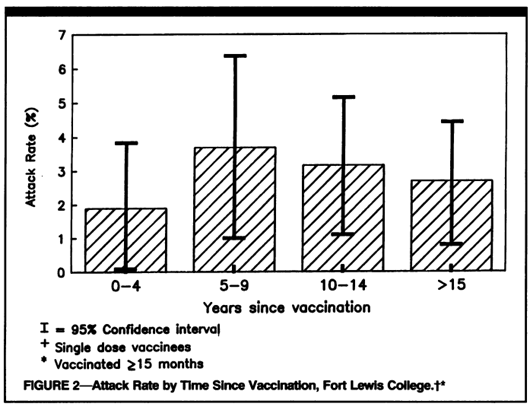Bradley S. Hersi, MD, MPH, Laui E. Markowitz, MD, Richard E. Hoffinan, MD, MPH, DanielR Hoff, PA, Mary J. Doran, Jessica C. Fleishman, Stephen R Preblud, MD, and WalterA. Orenstein, MD.
A measles outbreak at a college with a prematriculation immunization requirement.
Am J Public health. 1991 Mar;81(3):360-4.
Quotes from the study and comments
 Abstract: In early 1988 an outbreak of 84 measles cases occurred at a college in Colorado in which over 98 percent of students had documentation of adequate measles immunity (physician diagnosed measles, receipt of live measles vaccine on or after the first birthday, or serologic evidence of immunity) due to an immunization requirement in effect since 1986.
Abstract: In early 1988 an outbreak of 84 measles cases occurred at a college in Colorado in which over 98 percent of students had documentation of adequate measles immunity (physician diagnosed measles, receipt of live measles vaccine on or after the first birthday, or serologic evidence of immunity) due to an immunization requirement in effect since 1986.
Many colleges have a prematriculation requirement for vaccination which means students are only accepted into the college upon verification of adequate vaccination. Thus, such college populations are 100% vaccinated.
 The American CollegeHealth Association and the Immunization Practices Advisory Committee of the US Public health Service (ACIP) have recommended that colleges and universities require students to present evidence of measles immunity as a condition for enrollment.
The American CollegeHealth Association and the Immunization Practices Advisory Committee of the US Public health Service (ACIP) have recommended that colleges and universities require students to present evidence of measles immunity as a condition for enrollment.
 Although there has been a 98 to 99 percent reduction in the number of annual reported cases from the pre-vaccine era, measles outbreaks still occur. Two predominant patterns of measles transmission have been observed: outbreaks occurring in predominately unvaccinated inner-city preschool-age children, and outbreaks occurring in highly vaccinated secondary school and college populations. While most outbreaks occur in secondary schools, cases from college campuses have accounted for between 1.5 percent and 19.8 percent of cases each year from 1980 to 1989 (Table 1). In 1983, the record low year for reported measles cases, campus outbreaks and non-campus cases associated with these outbreaks accounted for 32.4 percent of total cases.
Although there has been a 98 to 99 percent reduction in the number of annual reported cases from the pre-vaccine era, measles outbreaks still occur. Two predominant patterns of measles transmission have been observed: outbreaks occurring in predominately unvaccinated inner-city preschool-age children, and outbreaks occurring in highly vaccinated secondary school and college populations. While most outbreaks occur in secondary schools, cases from college campuses have accounted for between 1.5 percent and 19.8 percent of cases each year from 1980 to 1989 (Table 1). In 1983, the record low year for reported measles cases, campus outbreaks and non-campus cases associated with these outbreaks accounted for 32.4 percent of total cases.
As we have previously noted, vaccination simply pushes disease incidence into an older age group. You can see that in the unvaccinated inner-city groups, those catching measles were in the preschool-age, the normal age for catching measles. Measles is a mild disease and serves as an important milestone in immune and general development of the child. Given observation and attention, the disease is rarely fatal in the developed world where nutrition and general living standards are high. High dosage Vitamin C and Vitamin A can be used to treat the disease very effectively.
However, in the vaccinated groups, most of the outbreaks are occurring in secondary school and college populations. So vaccination did not give them life-long natural immunity. Primary vaccine failures (where a person does not produce the amount of antibodies as expected after vaccination) and secondary vaccine failures (where antibodies produced after vaccination have dwindled over time) are used to explain measles outbreaks in such populations. Thus, "failure to seroconvert" (i.e. produce enough antibodies) and "time after vaccination" are considered "risk factors" for vaccine failure.
 In early 1988, a measles outbreak occurred at a college that had implemented such an immunization requirement. This outbreak provided an opportunity to investigate the occurrence of measles in a highly vaccinated college population and to examine potential risk factors for measles vaccine failure.
In early 1988, a measles outbreak occurred at a college that had implemented such an immunization requirement. This outbreak provided an opportunity to investigate the occurrence of measles in a highly vaccinated college population and to examine potential risk factors for measles vaccine failure.
 The Fort Lewis College measles outbreak occurred in spite of virtually complete implementation of a prematriculation measles vaccination requirement. It was thus similar to outbreaks that have occurred in recent years among highly vaccinated junior and senior high school populations. While the prematriculation requirement may have prevented a larger outbreak, it is apparent that measles outbreaks, such as the one described, can occur in highly vaccinated populations.
The Fort Lewis College measles outbreak occurred in spite of virtually complete implementation of a prematriculation measles vaccination requirement. It was thus similar to outbreaks that have occurred in recent years among highly vaccinated junior and senior high school populations. While the prematriculation requirement may have prevented a larger outbreak, it is apparent that measles outbreaks, such as the one described, can occur in highly vaccinated populations.
 Although age of vaccination was found to be a risk factor, 60 percent of cases occurred in students vaccinated at 15 months or older. As in other investigations, there was no evidence in this outbreak that the risk for measles increases with time since vaccination.
Although age of vaccination was found to be a risk factor, 60 percent of cases occurred in students vaccinated at 15 months or older. As in other investigations, there was no evidence in this outbreak that the risk for measles increases with time since vaccination.
A chart is provided to illustrated this:
The authors also noted another five studies establishing the same, that is, "time since vaccination" does not increase the risk, so those recently vaccinated are at equal risk to those who were vaccinated at a much earlier age.
The authors say:
 The occurrence of measles outbreaks in populations with high immunization levels suggests that the estimated 5 to 10 percent vaccine failure rate may still provide enough susceptibles to allow sustained transmission of a virus as communicable as measles in some settings, such as a college dormitory.
The occurrence of measles outbreaks in populations with high immunization levels suggests that the estimated 5 to 10 percent vaccine failure rate may still provide enough susceptibles to allow sustained transmission of a virus as communicable as measles in some settings, such as a college dormitory.
This is one of many statements in many studies and reports that amount to an admission that it doesn't look like the "eradication of measles" is a realistic goal.
The authors conclude:
 Measles elimination has proved more difficult than previously predicted. A single dose strategy, while highly effective, has not been able to totally prevent measles outbreaks. The full implementation of a routine two-dose measles vaccination schedule, however, should help reduce measles outbreaks in highly vaccinated populations.
Measles elimination has proved more difficult than previously predicted. A single dose strategy, while highly effective, has not been able to totally prevent measles outbreaks. The full implementation of a routine two-dose measles vaccination schedule, however, should help reduce measles outbreaks in highly vaccinated populations.
Single doses are not able to prevent measles outbreaks. And routine two-dose measles vaccinations should "should help reduce measles outbreaks in highly vaccinated populations", in other words, this is just another way of saying two-dose vaccinations are not able to prevent measles outbreaks either.
 Articles
Articles




 Abstract: In early 1988 an outbreak of 84
Abstract: In early 1988 an outbreak of 84 






